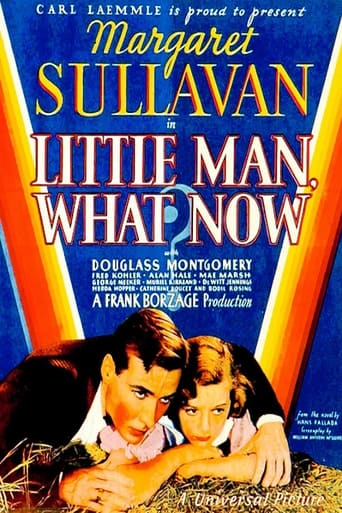bkoganbing
I see that the German cinema did a version of Little Man What Now a year before this Universal Picture came out. Depending on exactly when Dr. Goebbels took over their movie industry the message would have been far more polemic than here. I could see this as good material for either a Nazi inspired film or a left wing one.But Frank Borzage as director always seems to concern himself with the plight of young lovers, the truly innocent of the world and how forces around them are buffeting their chances at happiness. Which seems to be a capital sin in Borzage films.A lot similarity between this one and later Borzage works like Three Comrades and The Mortal Storm which also starred Margaret Sullavan. In Little Man What Now Douglass Montgomery and Margaret Sullavan are a pair of young marrieds who just can't seem to get traction enough for Montgomery to earn a living and support Sullavan and the baby coming. As things go from bad to worse Montgomery is tempted to seek radical politics of some kind.My favorite scene in the film concerns poor Montgomery waiting on a self centered cinema star in the department store where he is currently employed. Alan Mowbray is unforgettable in that one scene. Interesting showing a the indulgences of a selfish man can have such an effect as Montgomery's job is on the line.Even now too many of us live two paychecks from the gutter and too many of us are tempted by demagogues as a result. In that way Little Man What Now is still a very relevant film.
jjnxn-1
Full of Borgaze's trademark swoony romanticism mixed with a touch of pre-code decadence. This tale of a struggling young couple also boasts Margaret Sullavan's enchanting sensitive performance, she seems to carry a gossamer glow with her where ever she goes. Alan Hale also adds much to the film as a sprightly good-hearted charlatan but what drags it down almost fatally is Douglass Montgomery in the male lead. To put it plainly, he stinks. He's a stiff blank slate that stops the film dead in its tracks whenever he's the focal point of the scene. You're left to wonder what a more effective actor such as Jimmy Stewart or Cary Grant could have made of the part and how much better the movie would have been because of their casting.
dbdumonteil
Peace and tolerance are the hero's favorite words."Little man what now" was the first part of the trilogy which encompassed "three comrades" and would culminate in "the mortal storm" .The three movies featured the same star (Margaret Sullavan) and depicted life in Germany before WW2."Little man" -although Hitler came to power in January 1933- ,like "Three comrades" ,remains vague as far politics are concerned.But we feel while the heroes pace up up and down the street that there's something in the air (the first pictures).In "three comrades" ,the ending in the graveyard tells us that "they" are in town.And "the mortal storm" connects all the links and is the absolute masterpiece Borzage always threatened to make."Little man" is an overwhelming movie.Lammchen and Hans believe in love ,tolerance and peace and the world they live in is harshness ,selfishness, corruption and contempt.Hans's longing for human warmth is harrowing in the scene with the nurse.With an exception, when Hans is looking for a job,he meets people who enjoy humiliating and demeaning their fellow men."Little man" is full of strong scenes : the stroll in the country where the outside world (the hateful Kleinholz) will not leave the heroes alone; the actor who wants to play the part of a guy who "lives on the wrong side of the town" but who does not show any compassion when he meets one of those guys.Margaret Sullavan on the carousel,confessing she ate all the salmon she bought; on a bench in the park feeding the pigeons .Both Hans and Lammchen display the same naiveté : she really did know that near the pigeons ,there was a man and his wife who were starving.Hans did not know either that his stepmother's parties were very bad things.When the movie ends,there's another little man who,says Lammchen, will be by your side and help you cope with your struggle .Watching "little man" (or any of Borzage's movies) helps you be a better human being.
Janiemhart
This movie represents the best of the early '30s soap opera genre. Based on an earthy German novel, it satisfies from the opening credits to the end. Margaret Sullavan was never more eager, poignant or believable and I think it must be the role that made her a star. Douglass Montgomery showed a promise he was never again given a chance to develop or display in Hollywood. The supporting cast included Alan Hale and Mae Marsh, two of the best actors in the business at the time. In my opinion, MGM got a great return on its investment. This movie managed to stay within the bounds of the excessive censorship in effect at the time (although some of the plot does come up to the line) and although it showed how desperate times call for desperate measures, it never lost its message of faith and hope. I hope it's available on DVD soon.




